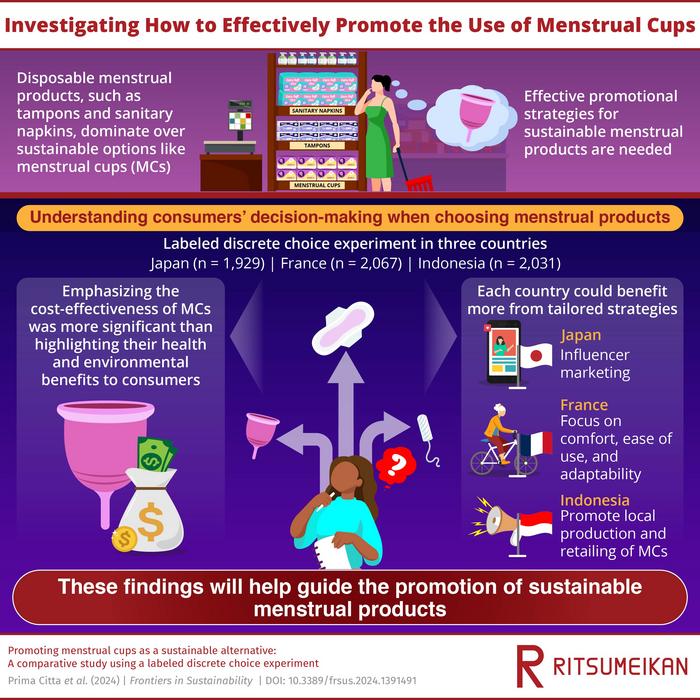In recent decades, single-use plastics have pervaded modern societies, causing a significant surge in plastic pollution that exacts a heavy toll on our environment. Addressing this issue requires prioritizing sustainable alternatives to single-use plastics wherever feasible.

Credit: Takuro Uehara from Ritsumeikan University
In recent decades, single-use plastics have pervaded modern societies, causing a significant surge in plastic pollution that exacts a heavy toll on our environment. Addressing this issue requires prioritizing sustainable alternatives to single-use plastics wherever feasible.
Disposable menstrual products are a notable contributor to plastic waste, with billions of sanitary napkins and tampons being discarded every year. Despite the availability of sustainable options like menstrual cups (MCs), consumer preference for single-use products remains dominant across many countries. Many possible reasons for this have been reported in previous studies, such as inadequate awareness of MCs’ maintenance and their environmental benefits, as well as preconceived notions about comfort and health impacts. However, it is not entirely clear how consumers incorporate these factors when deciding which menstrual products to purchase, which in turn makes it harder to devise effective promotional campaigns for MCs.
To address this knowledge gap, an international research team set out to understand how different information on menstrual products affects the decision making of consumers in different countries. Their study was published on June 24, 2024, in Volume 5 of Frontiers in Sustainability. Led by Professor Takuro Uehara from Ritsumeikan University, in collaboration with Ms. Sitadhira Prima Citta from Ritsumeikan University, Dr. Mateo Cordier from Université de Versailles-Saint-Quentin-en-Yvelines, Dr. Takahiro Tsuge from Sophia University, and Dr. Misuzu Asari from Research Institute for Humanity and Nature, the study employed large-scale online surveys and discrete choice experiments (DCE) to explore consumer decision-making across France, Japan, and Indonesia—countries with diverse socioeconomic and cultural contexts. Simply put, participants of the online surveys were presented with three options for menstrual products, namely MCs, sanitary napkins, and tampons. Different groups of participants also received different types of information regarding the products, such as their human health and environmental impact, and cost-effectiveness of MCs.
After analyzing the survey results, the researchers found that providing information about the superior cost-effectiveness of MCs was quite impactful in all three countries. “While sanitary napkins remain the most commonly used menstrual products in the surveyed countries, our study revealed that emphasizing the economic benefits of MCs can enhance their adoption compared to health and environmental benefits information,” states Uehara, “This shows that tailored information efforts emphasizing on cost saving could play a crucial role in promoting the use of MCs as sustainable menstrual products.”
The researchers then considered potential strategies to turn MCs into consumers’ menstrual product of choice. “Government and non-profit organizations could launch educational campaigns highlighting the long-term financial benefits of MCs over disposable products, using health professionals, companies, and media outlets to spread this information. Placing cost-per-use information near MCs at points of purchase, a strategy known as simplification and framing, may also nudge consumers towards sustainable products,” muses Uehara.
It is worth noting that the research team also explored the necessity of developing tailored strategies for each country, taking into account differences in consumers and markets. For instance, in Japan, influencer marketing and educational initiatives could effectively address public apprehensions and limited knowledge about MCs. In France, marketing efforts should emphasize the ease of use, comfort, and adaptability of MCs to an active lifestyle. Meanwhile, in Indonesia, where availability may pose a challenge, promoting locally produced MCs could not only boost adoption but also support small- and medium-sized enterprises.
Finally, Uehara notes the importance of equitable access and information if MCs are to become a mainstay. “The free provision of MCs can significantly enhance their adoption and help alleviate period poverty, particularly in low- and middle-income countries. However, these initiatives must ensure that the introduction of free MCs is accompanied by educational efforts to inform users about their benefits and maintenance requirements,” he concludes.
These efforts will hopefully lead to better marketing and promotional strategies for MCs, ultimately helping to create a more sustainable society free of plastic pollution.
***
Reference
Title of original paper: Promoting menstrual cups as a sustainable alternative: A comparative study using a labeled discrete choice experiment
Journal: Frontiers in Sustainability
DOI: 10.3389/frsus.2024.1391491
About Ritsumeikan University, Japan
Ritsumeikan University is one of the most prestigious private universities in Japan. Its main campus is in Kyoto, where inspiring settings await researchers. With an unwavering objective to generate social symbiotic values and emergent talents, it aims to emerge as a next-generation research university. It will enhance researcher potential by providing support best suited to the needs of young and leading researchers, according to their career stage. Ritsumeikan University also endeavors to build a global research network as a “knowledge node” and disseminate achievements internationally, thereby contributing to the resolution of social/humanistic issues through interdisciplinary research and social implementation.
Website: http://en.ritsumei.ac.jp/
Ritsumeikan University Research Report: https://www.ritsumei.ac.jp/research/radiant/eng/
About Professor Takuro Uehara from Ritsumeikan University, Japan
Takuro Uehara obtained M.S. in Economics and PhD in Systems Science/Economics from Portland State University in 2011 and 2012, respectively. He joined Ritsumeikan University in 2013, where he currently serves as Professor at the College of Policy Science. His research interests are diverse, including plastic waste, electric waste, ecosystem services, relational values, and the sustainability assessment of coastal zones. He has employed various quantitative methods, system dynamics techniques, agent-based simulations, and stated preference methods. He has published over 50 papers in peer reviewed journals.
Funding information
This research was funded by the Environment Research and Technology Development Fund of the Environmental Restoration and Conservation Agency of Japan [grant number JPMEERF21S11920].
Journal
Frontiers in Sustainability
DOI
10.3389/frsus.2024.1391491
Method of Research
Survey
Subject of Research
People
Article Title
Promoting menstrual cups as a sustainable alternative: A comparative study using a labeled discrete choice experiment
Article Publication Date
24-Jun-2024
COI Statement
The authors declare that this study was conducted in absence of any commercial or financial relationships that could be construed as potential conflicts of interest.




